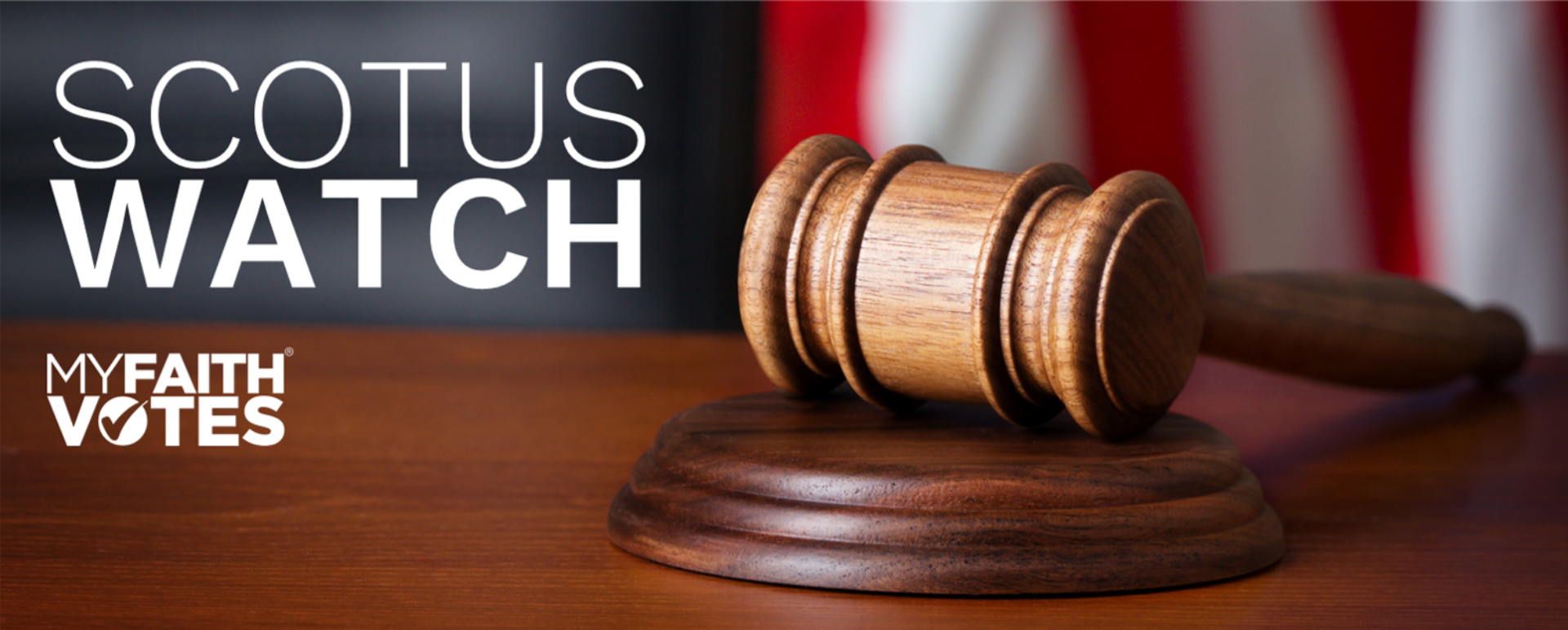
SCOTUS Watch | June 28, 2019
The Supreme Court’s session is coming to a close, and in May and June, they have issued numerous important rulings.
Here are five Supreme Court rulings worth noting:
- American Legion v. American Humanist Association
- Box v. Planned Parenthood of Indiana and Kentucky, Inc.
- Knick v. Township of Scott, Pennsylvania
- Department of Commerce v. New York
- Rucho v. Common Cause
American Legion v. American Humanist Association
In the case better known as the Bladensburg Peace Cross Case, the Supreme Court ruled 7-2 in favor of the World War I Memorial in Maryland to remain standing. A local American Legion Post erected the Bladensburg Cross in 1925 to honor the memory of 49 men in uniform who gave their lives on the battlefield in WWI. The Humanist Association fought for the cross to be torn down and argued the memorial was unconstitutional because the cross violated the Establishment Clause of the First Amendment of the Constitution. However, just last week, the Supreme Court ruled by a strong consensus that the memorial would be allowed to stand. Only Justice Ruth Bader Ginsburg and Justice Sonia Sotomayor dissented.
Justice Alito wrote the majority opinion stating, “Destroying or defacing the Cross that has stood undisturbed for nearly a century would not be neutral and would not further the ideals of respect and tolerance embodied in the First Amendment.” Kelly Shackelford, CEO of First Liberty representing the America Legion, stated, “This is a landmark victory for religious freedom. The days of illegitimately weaponizing the Establishment Clause and attacking religious symbols in public are over.”
And while this is a tremendous victory for religious freedom, many believe the ruling was narrow in scope. According to the analysis of First Things, “The Bladensburg Cross and similar longstanding ‘monuments, symbols, and practices’ will survive. But whether state and local governments can sponsor new monuments, symbols, and practices with religious elements, and what test the Court will use to evaluate them, remain uncertain.”
Justice Gorsuch and Justice Thomas did not join Alito’s majority opinion but instead wrote their own opinions arguing that the Court’s reasoning should also apply to new religious monuments and practices. In total, there were seven additional opinions issued by the Justices, further revealing that the Court is still in disagreement on the Establishment Clause. However, as Justice Gorsuch said, this is a “welcome step” in the right direction.
Box v. Planned Parenthood of Indiana and Kentucky, Inc.
The Supreme Court upheld a pro-life provision of an Indiana and Kentucky law at the end of May that requires aborted fetal remains to be buried or cremated. The U.S. Court of Appeals for the 7th Circuit struck down the Indiana law in 2018 claiming there was no interest for the state to “disposal of human remains.” However, the Supreme Court reversed the lower Court’s decision based on the precedent set by Akron v. Akron Center for Reproductive Health Inc., which mandated the proper disposal of fetal remains. The Supreme Court’s reversal of the 7th Circuit’s decision is significant because it, again, affirms that an aborted fetus is in fact human. The Supreme Court, however, did not reverse the 7th Circuit Court’s decision to strike down the portion of the Indiana law that prohibits abortions on the basis of sex, race, and disability. Justice Thomas addressed this provision of the law writing, “Technological advances have only heightened the eugenic potential for abortion, as abortion can now be used to eliminate children with unwanted characteristics, such as a particular sex or disability.” There are eight states with similar laws to Indiana, so pro-life advocates remain hopeful that another case will reach the Supreme Court soon. Analysts believe the conservative pro-life justices on the bench are likely to chip away at Roe v. Wade instead of overturning it in a single ruling.
Knick v. Township of Scott, Pennsylvania
The Supreme Court ruled on a 5-4 vote in favor of Rose Mary Knick overturning a precedent that had been in place for more than 30 years. The Township of Scott, in Pennsylvania, has an ordinance requiring all cemeteries on public or private land to be accessible to the general public during the day. Rose Mary Knick owns 90 acres of property and law enforcement agents claim to have found stones on her property that they believe to be grave markers. Ms. Knick argues there is no existence of a cemetery on her property. She filed suit claiming a Fifth Amendment violation. However, a 1985 Supreme Court precedent, Williamson County Regional Planning Commission v. Hamilton Bank, required that plaintiffs must go through the state’s compensation procedure first to obtain just compensation before taking their case to a federal court. With Knick’s victory, the state-litigation requirement of this prior ruling is overruled.
Chief Justice John Roberts wrote the majority opinion stating, “Contrary to Williamson County, a property owner has a claim for a violation of the takings clause as soon as a government takes his property for public use without paying for it.” The taking clause states, “[N]or shall private property be taken for public use, without just compensation.”
The five conservative justices ruled in favor of an individual’s property rights, and in support of Ms. Knick in this case, and the liberal justices on the bench, Justices Kagan, Ginsburg, Breyer and Sotomayor all dissented.
Department of Commerce v. New York
In a 5-4 decision, the Supreme Court ruled that the Trump administration cannot include a citizenship question on the 2020 census. Chief Justice John Roberts joined the four liberal justices on the bench to strike down this measure. The citizenship question was asked from 1820-1950 and re-introduced to the census in 2020 to assist the U.S. Department of Justice ensuring voting rights are not abused. The endeavor sparked outrage in states across the nation causing more than 18 states to file lawsuits claiming the question would violate the Enumeration Clause and the Administrative Procedure Act. Their main concern is that illegal residents in the U.S. would be far less likely to respond to the census and could fear deportation. Chief Justice Roberts wrote the majority opinion stating Executive branch officials must “offer genuine justifications for important decisions, reasons that can be scrutinized by courts and the interested public.” While the decision is a setback for President Trump’s administration, the Court’s decision does leave the door open to provide additional justification for the question to be allowed in the future.
Rucho v. Common Cause
In another close decision, the Supreme Court ruled 5-4 that North Carolina’s claim of partisan gerrymandering is beyond the reach of the courts.
In 2016 two organizations, Common Case and League of Women Voters, filed a lawsuit in North Carolina claiming the congressional map created by the Republican-led legislature remained illegal because it was political gerrymandering. Redrawing district lines has long been an issue as one political party often holds power and draws the lines in their favor. In the case Gill v. Whitford, from the previous Supreme Court Term, the Court ruled that no standards are to be upheld to judge in these situations, and that it may be impossible to take politics out of the equation. The four liberal justices on the bench believe the Supreme Court should step in to put an end to gerrymandering. In their opinion piece last year, they wrote, “only the courts can do anything to remedy the problem, because gerrymanders benefit those who control the political branches.”
However, with Justice Kavanaugh now on the bench, the issue of partisan gerrymandering is decided. Chief Justice Roberts wrote the majority opinion explaining that if the Courts weighed in on this case it would be “an unprecedented expansion of judicial power.” Justice Kagan wrote the dissenting opinion stating, “For the first time ever, this Court refuses to remedy a constitutional violation because it thinks the task beyond judicial capabilities."
###
My Faith Votes— is a ministry that motivates, equips, and activates Christians in America to vote in every election, transforming our communities and influencing our nation with biblical truth. An estimated 25 million Christians who are registered to vote, fail to vote in presidential elections. My Faith Votes is on a mission to change this statistic by helping Christians act on their faith and vote in every election. When we pray unceasingly for our nation, think biblically about the issues, and vote consistently in every election the impact of Christians taking action from the local to the state and federal level will be unprecedented.
Website | www.myfaithvotes.org Twitter | @MyFaithVotes Facebook | My Faith Votes

 TV
TV